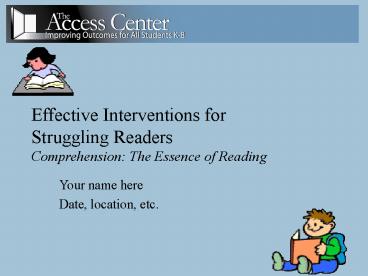Effective Interventions for Struggling Readers Comprehension: The Essence of Reading - PowerPoint PPT Presentation
1 / 22
Title:
Effective Interventions for Struggling Readers Comprehension: The Essence of Reading
Description:
Learn how effective reading interventions impact all stakeholders ... Cognitive deficit. Attention deficit disorder. Sensory Impairment ... – PowerPoint PPT presentation
Number of Views:4875
Avg rating:5.0/5.0
Title: Effective Interventions for Struggling Readers Comprehension: The Essence of Reading
1
Effective Interventions forStruggling
ReadersComprehension The Essence of Reading
Your name here Date, location, etc.
2
Agenda
- Impact of Reading Interventions
- Factors That Interfere With Comprehension
- Assessment
- Strategies and Practice
- Processing
3
Goal and Objectives
- Goal To provide participants with the tools to
improve reading comprehension for struggling
readers. - Objectives
- Participants will
- Learn how effective reading interventions impact
all stakeholders - Learn why some students have difficulty
comprehending text - Learn how to effectively assess the comprehension
skills of struggling readers - Learn and apply evidenced-based comprehension
strategies
4
Warm-Up Activity
- Read the selection on HO 1
- Be prepared to respond to several comprehension
tasks
5
The Connections Between Reading Interventions,
NCLB, and YOU!
6
Gap
Benefit Students Teachers Schools Districts
States
7
Essential Components of Reading
- Phonemic Awareness
- Phonics
- Fluency
- Vocabulary
- Comprehension
- Comprehension Components of an Effective
Reading Program http//www.k8accesscenter.org/tra
ining_resources/effectivereadingcomponents.asp
8
Discussion
- Share with your partner examples of students you
know who struggle with comprehension. Discuss why
you think they may be having difficulty. - Share with your partner any comprehension
strategies you currently use, or know about.
9
Students Who Struggle
- Students with disabilities
- Dyslexia
- Traumatic brain injury
- Learning disability
- Cognitive deficit
- Attention deficit disorder
- Sensory Impairment
- Students with skill deficits in the reading
components - Students who are not task persistent
- Students who lack appropriate background
knowledge - Students who are not engaged in reading
- Students who are not motivated to read
10
What Can Practitioners Do
- Students with disabilities
- Increase your knowledge base
- Provide accommodations
- Skill deficits
- Conduct screening assessments
- Provide remediation
- Lack of appropriate background knowledge
- Conduct screening assessments
- Implement pre-reading activities
- Lack of engagement
- Select appropriate text
- Allow for choice
11
Comprehension AssessmentsThings to Consider
- Different tests tap different abilities.
- Tests do not usually help pinpoint difficulties
in individual students. - Tests are not geared toward distinguishing
specific comprehension processes that might
underlie poor comprehension in both listening and
reading. - Spear-Swerling (2006)
12
What Practitioners Can Do
- Look for and use tests that are technically
adequate - If possible, use more than one test
- Assess key component skills
- Take everyday classroom performance into account
- Consider both current and upcoming grade
expectations - For more information about comprehension
assessments, go to the Web site of the Southwest
Education Development Laboratory
http//www.sedl.org/reading/framework/assessment.h
tml
13
How Do YouAssess Comprehension
14
Instructional Strategies andPractice
15
National Reading Panel (2000)Key Findings
- Teaching a combination of reading comprehension
techniques is the most effective. - When students use comprehension techniques
appropriately, they assist in recall, question
answering, question generation, and summarization
of texts. - When reading comprehension techniques are used in
combination, these can improve results in
standardized comprehension tests. - Teachers must be provided with appropriate and
intensive training to ensure that they know when
and how to teach specific strategies.
16
Evidenced-BasedComprehension Strategies
- Cooperative Learning
- Comprehension Monitoring
- Graphic Organizers
- Answering Questions
- Summarization
- National Reading Panel (2000)
17
Cooperative Learning
- A successful teaching strategy in which small
teams use a variety of learning activities to
improve their understanding of a subject - Key Elements
- Positive Interdependence (sink or swim together)
- Face-to-Face Interaction (promote each other's
success) - Individual and Group Accountability (no
hitchhiking or social loafing) - Interpersonal and Small-Group Skills
- Group Processing
18
The Jigsaw
- All students
- Learn about pieces of the puzzle of material
- Share their findings
- Solidify their learning by teaching to other
students
19
Instructions forHome Teams
- Introduce yourself
- Select a leader
- Have group leaders assign team members to Expert
Group (including yourself) - Join your Expert Group
- Select a leader
- Expert Group Read the background information,
complete the activity, and develop a
dissemination plan - Return to your Home Team and share your
findings with your team
20
Your Cooperative Learning Experience
- Refer to Slide 17
- Take a few minutes to discuss which of the key
elements of Cooperative Learning you experienced
during the Jigsaw strategy exercise
21
Culminating Activity
- Think of a student/s you have in your class, or
have worked with in the past. - Which of the strategies you learned about today
may be helpful to them? - Explain to your team why this particular activity
would work for this student/s. - Describe how you would implement this strategy in
your classroom.
22
Questions/Comments































